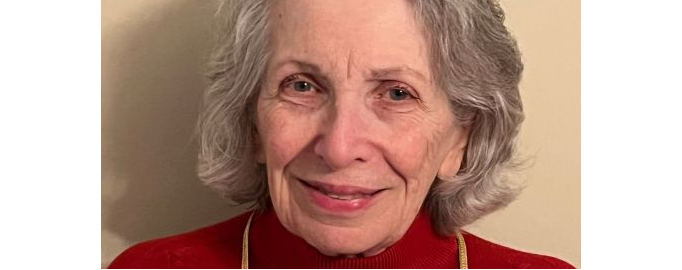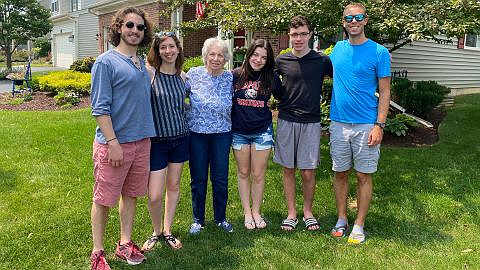Secrets of ‘Cognitive SuperAgers’
December 2, 2022 at 9:58 a.m.
SuperAger Carol Seigler is shown with her grandchildren (from left): Alex Siegler, 23; Elizabeth Siegler, 27; Carol Siegler, 85; Megan Boyle, 18; Conor Boyle, 17; Jacob Siegler, 29. Photo courtesy Jennifer Boyle
Take 85-year-old Carol Siegler. She volunteers and works out at the gym several days each week, socializes frequently with friends and family, reads a lot, and does daily crossword puzzles. Still, she says she is restless.
“I’m bored,” she told CNN’s LaMotte. “I feel like a Corvette being used as a grocery cart.” She adds, “I have a great memory. I’ve always had it.” She’s even tried out for Jeopardy and did well enough to be invited to the live auditions. “Then COVID hit,” she remarks. “Who knows how well I could have done.” She admits she knows an awful lot about Beethoven and Liszt, but not so much about current musicians, like Beyonce and Lizzo. At age 82, she entered the American Crossword Puzzle Tournament for her age group, “as a gag.” She won.
 85-year-old Carol Seigler is a SuperAger
85-year-old Carol Seigler is a SuperAger
What is a SuperAger?
The term SuperAger was coined by the Northwestern researchers who created the program. To be recognized as a SuperAger, a person must be over age 80 and undergo extensive cognitive testing. “Acceptance in the study only occurs if the person’s memory is as good or better than cognitively normal people in their 50s and 60s,” writes LaMotte.
“SuperAgers are required to have outstanding episodic memory – the ability to recall everyday events and past personal experiences – but then SuperAgers just need to have at least average performance on the other cognitive tests,” said cognitive neuroscientist Emily Rogalski, a professor of psychiatry and behavioral sciences at Feinberg School of Medicine. SuperAgers have similar IQ levels as average agers, so the outstanding memory is not about superior intelligence. Still, only about 10% of people who apply to the program meet the criteria for the program, added Rogalski.
People accepted into the program have 3D brain scans taken. The cognitive testing and brain scans are repeated every year.
Bigger, tau-free neurons
The results of the study show that, while most people’s brains shrink as they age, the cortex of SuperAgers’ brains, which is responsible for thinking, decision-making and memory, remains much thicker and shrinks far more slowly than those of people in their 50s and 60s. SuperAger brains have bigger, healthier cells in the entorhinal cortex, which is one of the first areas hit by those with Alzheimer’s disease. The entorhinal cortex has direct connections to the hippocampus, which is essential for memory and learning.
SuperAger brains had three times fewer tau tangles, the abnormal formations of protein within nerve cells which are a hallmark of Alzheimer’s and other dementias, than the brains of cognitively healthy control subjects used for comparison. SuperAger brains also had more of a rare type of brain cell (von economo neurons), which are thought to allow for rapid communication across the brain. These neurons are also thought to be involved with paying attention and regulating emotions, other keys to a good memory.
“Taken together, these discoveries appear to point to a genetic link to becoming a SuperAger,” writes LaMotte.
Environment and lifestyle factors may play a role
In addition to their unique brains, SuperAgers share similar lifestyle traits, including staying physically active while they age and by challenging their brains every day in a variety of ways. Many continue to work until their 80s and volunteer in the community. SuperAgers also tend to have a positive outlook on life and are “social butterflies” – surrounded by family and friends. Scientists think that SuperAgers may have a combination of genetics and lifestyle choices to thank for their superior memories. “This social connectedness may be a feature of SuperAgers that distinguishes them from those who are still doing well but who are what we would call an average or normal ager,” said Rogalski.
Carol Siegler applied for the SuperAger study after seeing an advertisement for the program on television. She thought it sounded like an adventure. She learned that she is, indeed, a SuperAger. She concludes that she was just born lucky.
You can read the full CNN article and find links to related articles here: here.





